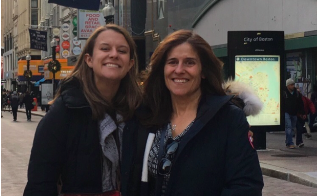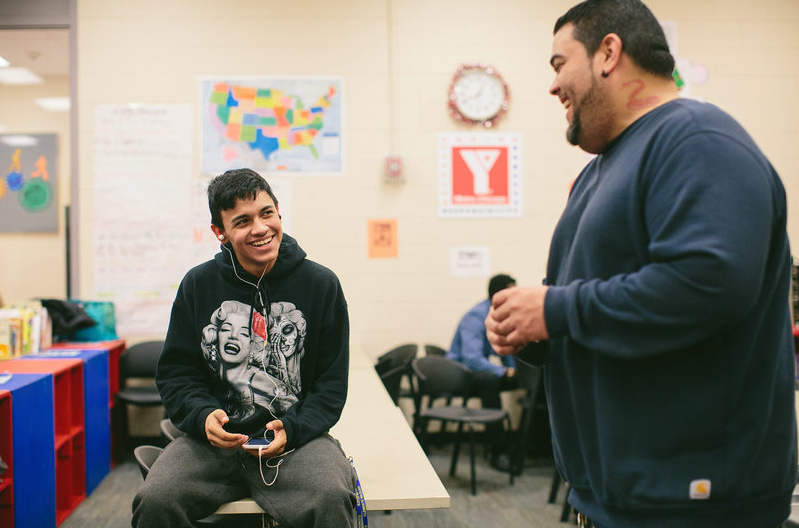Profiles in Mentoring: A conversation with Jean Rhodes and Audrey Wittrup
The following is an excerpted conversation held with Jean Rhodes, Ph.D., and her daughter, Audrey Wittrup, M.A.. Jean is the Frank L. Boyden Professor of Psychology at UMass Boston and Director of the Center for Evidence-Based Mentoring. Audrey is a doctoral student in clinical psychology at the University of Virginia. Audrey and her colleagues’ latest published research was recently featured on the Chronicle.
The Chronicle: Thank you Jean and Audrey both for taking the time to speak with me today. To start us off, why don’t you tell us a little bit about yourself and your research interests, Audrey?
Audrey Wittrup: Sure. I received my undergraduate degree in Psychology from the University of Michigan and am now enrolled in the Clinical Psychology Doctoral Program at the University of Virginia. I’m working with Professor Noelle Hurd and am investigating the roles that natural mentors can play in promoting academic self-efficacy for all students, but with a particular focus on students who are part of marginalized populations.
TC: What drew you to this topic initially and your field of study more broadly?
AW: I initially came to be interested in the topic of natural mentoring through my work on women in STEM with Professor Jacquelynne Eccles at Michigan and later on a project studying students’ favorite teachers. Even though I was focusing on the teacher relationships, I kept being drawn more towards the psychological implications of the work. I also worked as a camp counselor and in a prison, and so I kept seeing these informal, powerful relationships help to scaffold students and youth who would otherwise be facing a lot of challenges.
TC: Jean, how has it been for you to watch your daughter find her way to your own field of expertise?
Jean Rhodes: Honestly it’s been surprising. Audrey really didn’t ask about my work or research as she was growing up. In fact, she still doesn’t [laughs]. I think it’s more that we are similar people who have similar interests. It has been a balancing act, though. Part of me wants to get involved and join in, but part of me knows to hold back. What I have really appreciated though, is that we enjoy each other’s company and presence a lot, and when we’re together it’s not really work-focused for either of us.
TC: So Audrey, thinking about flipping the script a bit, are there any lessons you think you could teach Jean?
AW: [laughs] Well, I don’t know about that, but I can say that, as a mom, she’s taught me everything. In a lot of ways parents can be similar to mentors and share similar roles at times. Like all relationships, there are difficulties, but I always learn something from her work and research, both personally and more generally.
TC: What aspects of your growth in this field would you say have shaped your current interests and aspirations? Did your mom have a role to play in that?
AW: Oh gosh, it’s a bit of everything I’ve done that has helped me develop my perspective and direction in the field. As far as my mom’s work, like I said it always offers something to learn and draw from. I also am coming to appreciate and admire her role and reach in the field of mentoring. So I’ve really just been inspired by her work and draw on that to help push my own research and ideas further. I see it as a way to integrate her ideas and see what they look like in the contexts I’m studying.
TC: Let’s get a question for both of you: Where do you see your work heading in the future? Let’s start with Audrey.
AW: Given the current political climate, I can’t help but be reminded of the power of applying my work with natural mentors to support communities. I really see myself gravitating more towards doing community-based work as a way of expanding the scope of what mentoring can accomplish, and how it can promote better outcomes for marginalized communities.
JR: In a lot of ways, I also see my work, and the field more broadly, moving from investigating formal mentoring toward a deeper dive into the topic of natural mentors. It is funny, because that is where my work initially started when I first entered the field. And, as I get older, I also see myself moving more towards really valuing my work mentoring doctoral students. I feel as though their work is going to be my lasting legacy of impact on the field. So many of them are doing great work, including Audrey, and they are going to be carrying the torch forward and pushing mentoring in creative new ways to meet new challenges.
TC: Have you both thought about collaborating on any projects in the mentoring field in the near future?
AW: We’ve discussed a few things here and there, and my mom also came down to UVA to speak, which is about the closest it’s been to a collaboration.
JR: Audrey has a unique perspective with a lot to offer, and I respect that. Even though she is working in an area close to mine, she has different interests, different strengths, and got there through her own path. She has found her own perspective and voice, and I couldn’t be more proud!











